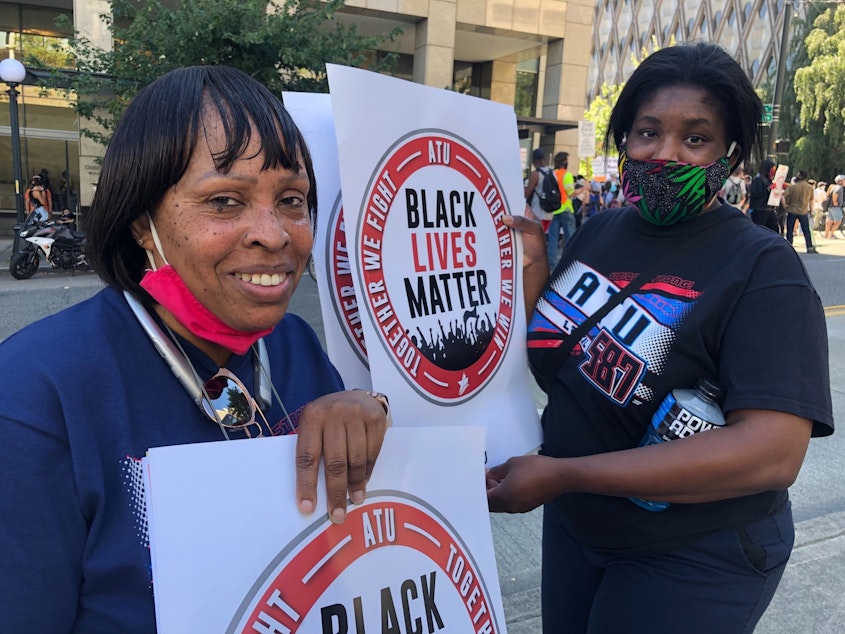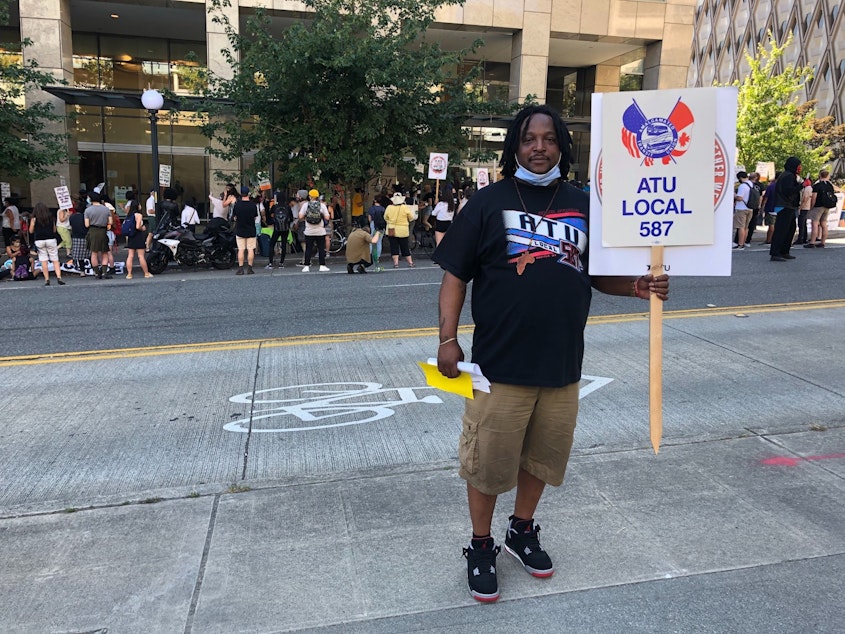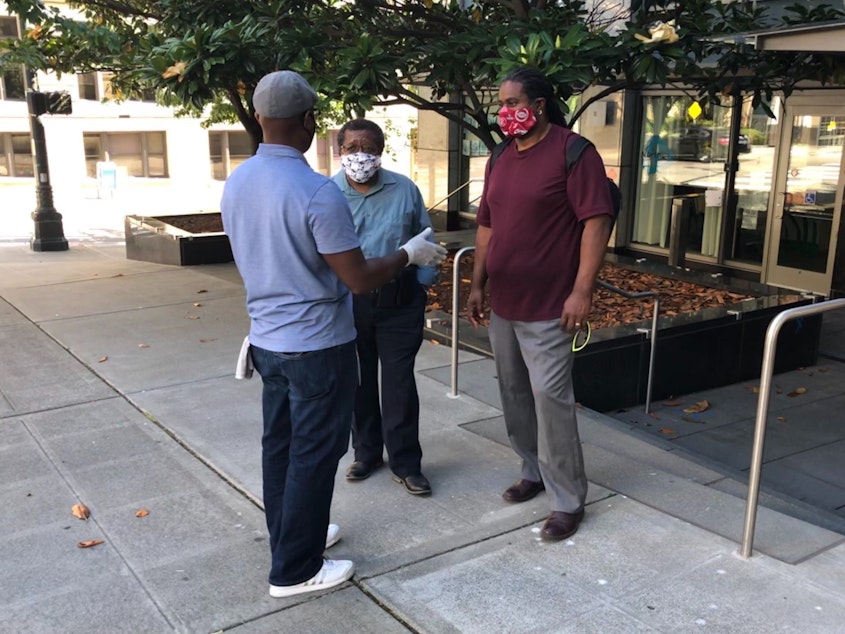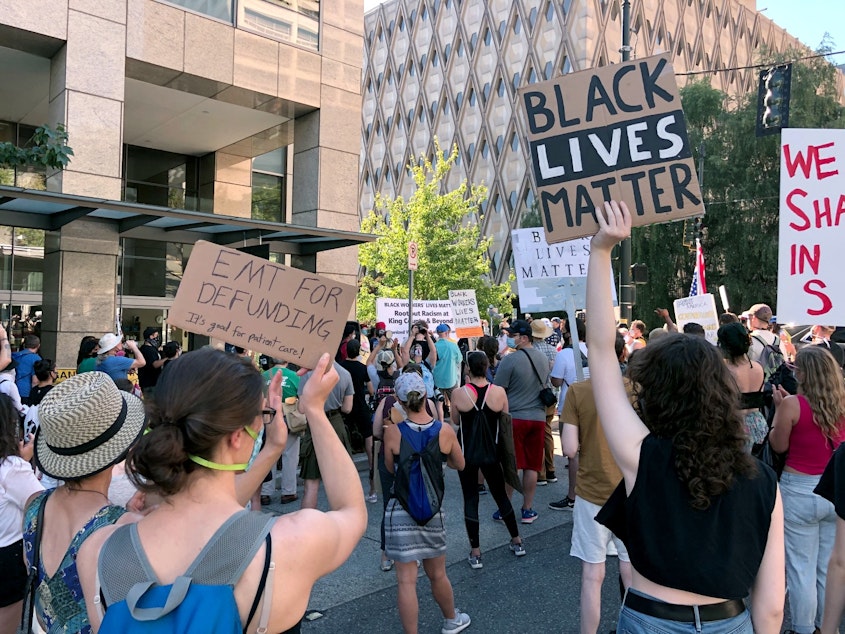King County Metro workers protest racism and pay inequities

Two forces came to a head this week at a protest in downtown Seattle: the economic impact of Covid and systemic racism.
First, the racism.
There was an incident at Metro’s South Base several weeks ago that shook many Metro workers. A statue of a black man was found near a flagpole rope that to many, looked like a noose.
Bus Driver Kenneth Bryant wanted to see Metro respond forcefully.
“Why didn’t my [employer] do something about it? Why didn’t they hunker down and find who did this and let them go?” he questioned. Bryant wanted the perpetrators fired.
The statue incident was just the latest example of racist harassment that Black workers have experienced at Metro.

Bryant said some drivers had intentionally used Metro's ticket punching tool to put holes in transfer tickets through the face of Martin Luther King Junior. Bryant said that's not something that would happen accidentally.
Metro Mechanic James Pratt brought a complaint to management about a white coworker who he said was harassing him, cussing at him, and honking his car horn at him aggressively.
"I went to another coworker and I vented frustrations with him, how I felt about this guy," Pratt said. "The next day, they took me off work. I was off work for a whole year."
Sponsored
Pratt said he learned the person he had complained about had influence over how Metro responded to complaints and used that influence to build doubt about Pratt's complaint.
Terry White is the Deputy General Manager for Metro. He said the agency plans to listen deeply and try to change.
He stood off to the side of the protest at 5th Avenue and Jefferson Street outside the County Executive's office on Monday afternoon.
White addressed the issue of the statue left at the flagpole, which was mentioned by several people present at the rally.
“We understand that it was more than just a statue. We understand that there’s a historical component to this where people are feeling like they have been harmed for years,” he said.
White said that, as a Black Metro employee of 33 years, he understands and won't run away from the agency's problems.

But resolving the issue is further complicated because it comes at a time when Metro is trying to renegotiate a labor contract with its drivers and mechanics due to Covid-19.
In his responses, White treated the two issues separately.
Regarding racism, he said, "The story we tell when we say everybody needs to have an opportunity to thrive... we need to mean that. We do mean that."
White was less clear what giving workers the opportunity to thrive means when it comes to labor negotiations. This negotiation, he said, is "similar to the negotiations that we've been conducting for years. A very collaborative process, with interest-based style bargaining."
Sponsored
Workers at Monday's rally said their contract, which included raises, was ready to be signed when Covid hit. Some said they watched as other public employees had their raises approved by the King Count Council, only to see Metro employees' request threatened by a county executive now having second thoughts due to budge constraints.
At Monday's rally, speakers spoke of staging a surprise occupation of County Executive Dow Constantine's office.

In speech after speech, speakers called attention to the intersection of racism and labor. Members of the Amalgamated Transit Union Local 587 and other supporters described the lack of adequate responses from management to racist harassment as indicative of disregard for worker concerns.
Bus driver Mechelle Penny said raises that workers negotiated before the pandemic should be honored, and management should take it seriously when workers report racist harassment.
Sponsored
“Since the George Floyd murder, they kind of want to talk to us, but they really don’t. They kind of want to just kind of stroke us a little bit, but [they] don’t want to get too deep into it," she said.
She characterized Metro's attitude as: "'We just want you all to get on the bus and drive,'" she said. "Which we would love to do. We would love to do that. But let's be fair about it."
Metro is facing criticism from both inside and outside of the agency.
Outside of Metro, Black Lives Matter Seattle King County is demanding the agency make public transportation free and immediately end fare enforcement.
Both critiques came Monday as part of National Day of Action for Black Lives.
King County Metro Spokesperson Jeff Switzer said in an email statement that his agency was working "toward being an anti-racist organization" and to improve its reporting process.
"We recognize and acknowledge the pain caused by the incident at South Facilities," Switzer said. He added that an investigation into the incident was conducted, but declined to share details about any disciplinary action taken.
"Metro continues to strongly encourage all employees with any reports of protected class discrimination, harassment, or retaliation to contact the Office of EEO, Equity, and Inclusion, even if the reports are older, so that we may address them," Switzer said.

